Tommy Stinson has quite a musical resume.
He played bass guitar for The Replacements, a Minneapolis rock band which still has a cult following decades after their albums were released and their legendary concerts often left wakes of destruction and baffled fans. Their 1984 album Let It Be is regularly ranked as one of the top albums of that decade.
After one more album, Tommy’s brother Bob was fired from The Replacements because of substance abuse issues, and he passed away a decade later. The band released several more acclaimed albums before calling it a day in 1991. Singer Paul Westerberg and Tommy reunited The Replacements in 2012 for a successful string of shows, but they broke up, apparently for good, in 2015.
Also, from 1998 until 2016, Tommy played bass guitar for Guns N’ Roses, including on the Chinese Democracy album which took a decade of recording to finish. Along the way, he has released well-regarded albums with Bash & Pop and as a solo artist.
This interview was for a preview article for noozhawk.com for the Cowboys in the Campfire concert on 9/14/18 at Gone Gallery in Santa Barbara. It was done by phone on 9/1/18. (Jeff Moehlis photo)
Jeff Moehlis: Can you tell us a bit about Cowboys in the Campfire?
Tommy Stinsonxz: It’s with my writing partner buddy Chip Roberts, who I met through my ex-wife. Her Uncle Chip is my songwriting partner because we hit it off really good. He was a local guitar hero guy from Philadelphia right around the time The Replacements were touring and stuff, back in the day. So the whole thing that happened was I got married to his niece, and he and I hit it off fabulously and started writing songs together, and we’ve been writing songs together now for about 11 years. We’re going to hopefully make a record by the end of October, a full length. We’ll probably release bits and pieces of it as singles and things like that. Yeah, after all this time.
How it really came about is that when I met him, I was still in Guns N’ Roses, and we had been joking about, you know, “What if we went out as a duo and just played coffee shops?” And, “Let’s go busking.” We were kind of screwing around with different ideas [laughs], just to screw with whatever and have fun, and do something interesting. What came of that was basically that. Three years ago we both found ourselves in the late spring going, “What do you want to do this summer?” “I don’t know, what do you want to do?” “I don’t know.” “Well, let’s get in the van and go play.” [laughs] So we did it. It was kind of a challenge in a way. But that’s the full-boat story of that. We’ve been touring since then, writing, and doing our thing.
JM: I saw you guys at a Wild Honey backyard show down in LA back in November, and I could tell that you were really enjoying yourselves. If I recall correctly, you also played some Bash & Pop songs rearranged for the duo.
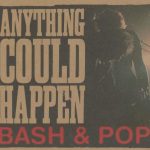
TS: Yeah, I mean, we’ve been working on songs to be just Cowboys songs, but I have to pull from some of my previous repertoire to pull it together and make a set long enough. There’s stuff that he and I have written from the last solo record I did, and even “Anything Could Happen” from the new Bash & Pop record – we wrote that together. There’s just a lot of things that I pull from to make an hour set, or whatever.
Our goal is to end up with our own vibe, our own thing, without having to pull too much from that, even though the songs that Chippy and I have written together have to be in the mix because they’re important whether its Cowboys in the Campfire or Bash & Pop or a Tommy Stinson solo record.
JM: I find it somewhat amazing how young you were when you started playing with The Replacements. How did you balance that with trying to have a normal teenage experience?
TS: Oh, there was fucking nothing normal about it. To be honest with you, it started before being a teenager. When we moved to Minnesota from Florida, my brother got really out there and was self-destructive, and trying to get his way back to Florida, because that’s what he liked and where his friends were and stuff like that. But we moved to Minnesota for particular reasons, and by the time my brother came out of the group home scenario, shit, I’d already been in jail three times. I don’t know if you’ve read that book [Trouble Boys: The True Story of The Replacements by Bob Mehr] or whatever, but that’s the real deal.
If my brother hadn’t come home and shown me how to play bass, I probably would’ve been arrested for much worse things within a few years. So, you start with that. You start with a crazy childhood to begin with, and then with completely ludicrous teenage years where your brother shows you how to play an instrument and then you go on the road and your mom signs off on your custodial papers [laughs] so that your manager can be in charge of taking care of you and stuff, and all this, that, and the other thing. Nothing normal about any of it [laughs]. Luckily I lived through it.
JM: The Replacements played in Santa Barbara in 1985. Do you remember anything about that show?
TS: Bill Hardy was a guy who promoted shows up in that region back in the day. He did The Hootenanny in LA – I don’t know if he’s still doing that. It’s been a while since I’ve seen him. What I recall is playing a couple of colleges at that time period. We were kind of unhinged, off the string, and doing our thing, kind of at the height of my brother’s playing and stuff. My brother would alternatively go with either a toga or a dress or a skirt. He got into watching Captain Sensible’s shenanigans from The Damned, and emulating that. I don’t remember a whole lot. UC Davis comes to mind, because we got in trouble.
JM: Probably not the first time, right?
TS: No, no. We didn’t get in a lot of legal trouble. We got in trouble like, “OK, so we broke a bunch of shit. We’ll pay for it. OK, cool!” “You owe us now” [laughs]. We really didn’t have the whole concept of “this could be your livelihood” [laughs], as opposed to, “Yeah, well you just broke a bunch of shit, and now you’re paying to play.” That’s the Polish joke in there, which I don’t subscribe to because I am Polish. It’s just kind of a goofy bit. We just weren’t that smart.
JM: I have a friend who was at the infamous Portland show with a couch going through the window and stuff like that.
TS: [laughs] Oh no, dude… That was as fucked up as Paul and I sitting with a fucking gallon bottle of fucking Jack Daniels in a kiddie pool with Alex Chilton in Houston. We couldn’t go back to either place for fucking five or six years. It was bad. It was brutal.
You know, again, our thing was – and I’ll just say this, and I want to get off the subject of this by the way – the thing was we took fun to an extreme. We didn’t try to hide… Other bands that we knew, and I’m going to leave them nameless right now because I’ve said enough about them over the years… You know, we didn’t really hide the fact that we might be hammered, or that we might be having more fun than everyone in the room. You just bought tickets – we also weren’t coy about “If you don’t like it, get your money back. Fuck it.” You know, there was enough of that going around that we would pay for our shortcomings, if you know what you mean.
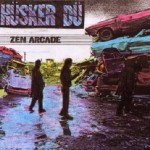
JM: I’m curious about the Minneapolis music scene back then, with other bands like Husker Du and Soul Asylum. Was it a friendly scene, or did you have a rivalry with those other bands?
TS: Here’s what I’ll say about the Minneapolis music scene in the ’80’s, and I’ve never seen anything like it since. Mind you – I’ve said this a ton but I’ll tell you right now – when we were growing up and doing our thing in the ’80’s, it was Husker Du, Soul Asylum, The Suburbs, there was Prince. There was a music scene unrivaled since, I think. And I mean that. Some people could probably equate the Seattle scene and that, but differently, because that’s a whole other thing, where there’s a music community. We had that. We all would hang out at the same parties, hang out together, play shows together. We did dates with Husker Du way back in the day in Chicago and other places, and The Suburbs and other bands like that from the Minneapolis scene. We all hung out together and played with each other. It was a whole music community.
And when I say it was unrivaled… I moved to LA in ’93, and there was kind of a music community, but nothing on par with what the ’80’s were in Minneapolis. There was just a vibrance, and not only an attitude but a whole scene that made it happen. That’s why – not to sit and fucking blow wind up my own skirt – people still talk about The Replacements or Husker Du or Prince or The Suburbs or any of these bands. All these bands meant something and did something for the musical community that made it an event, a whole thing.
JM: Were you paying much attention to what Prince and Morris Day and The Time were doing at the time?

TS: Hell yeah! Shit, my sister Lonnie used to go hang out at the club back when Prince and The Time jammed there. It was like an after-hours speakeasy in Minneapolis. It was a crazy thing. My sister’s five years my senior. But yeah, it was an enormous music scene back then, with all that. And we all paid attention to everything. I don’t know how much Prince or The Time were paying attention to our stupid asses, but we were all paying attention to everyone. We loved Prince and The Time and all that. Everyone was checking everyone out. “What’s going on over here?” “Wow, what’s going on over here?” We’ve got a hardcore scene, we’ve got a dance scence, we’ve got a punk rock scene, we’ve got this scene. It was a good thing, and like I said, it’s unrivaled. I have been all over the fucking world, and I ain’t seen nothing like it yet.
JM: I want to ask you about my favorite Replacements album Let It Be, which is now over 30 years old. Looking back on that now, what are your reflections on that particular album?
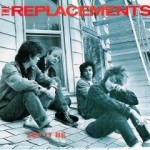
TS: That was somewhat of our crown jewel, in a way. It had the best of all of us, basically. My brother, Paul, Chris – we were all at the top of our game. We’d been touring a shit ton, and going through and jumping through hoops to get there, to get to that point. I think it’s, rightfully so in some ways, our crown jewel. We get to the Warner Brothers years, there’s a whole other crown jewel on that, too.
JM: Yeah, Let It Be set you up for signing to a major label. What was your major label experience like?
TS: We basically were The Replacements, and they were basically The Corporation, and we locked ourselves in a room to listen to our new record and locked them outside it. Hence, that is us shooting off not only our feet [laughs], we were aiming for our feet and shot off our head [laughs]. That’s our major label experience, really, honestly. It’s like, aim for your shoe to shoot off your foot, but you aimed and you shot yourself in the head. That’s what we did.
We had integrity in that, you know? People could sit and argue and fucking pontificate all fucking day long, and talk about how, “Shit, if they’d only done this, if they’d done that…” We knew everything we should’ve done, and we didn’t want to do fucking any of it. We just wanted to be us, and that was it. We made videos we didn’t like making, we fucking played radio shows we didn’t want to play. We tried to schmooze the fucking executives who wanted a blow job. We didn’t do any of that. We couldn’t fucking deal with it. So, you know, we just stayed true to form.
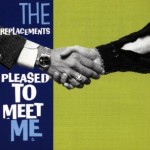
JM: My favorite album from the major label years is Pleased To Meet Me. What do you remember about that? You worked with Jim Dickinson…
TS: Yeah. Jim was a cantankerous, funny guy, and we had him because he’d done Big Star’s Third and all that. He was a whole beast on his own [laughs], unto himself, I guess. Yeah, it’s funny that I’ve made a couple of records with that guy before he passed. That was an interesting record, and I don’t think we have time to get into the differences in the two records I made with him, ten years separated. It’s an interesting story, actually, but you’ll have to save it for another piece.
JM: What was your brother Bob like?
TS: He was nuts. I mean, we’re all nuts, but my brother was nuts because of the way things went down for him. Not nuts, literally. But he had issues. We all have issues, but he wasn’t able to get around them, and those issues basically overtook him at one point.
And sadly, very sadly, the two weeks prior to him dying was when he got his own apartment, he was doing stuff, he was taking care of himself, wasn’t doing anything, and sadly his heart just gave out. You know, after all the shit, both family-oriented and related, as well as life running amok, the one thing I’ve always told people is that my brother had a heart of gold. When he loved you, he loved you. I mean, it could just be fucked up, and he would love you. He just had such a pure, beautiful heart. That was the whole bit about my brother.
JM: How was playing with Guns N’ Roses different from playing with The Replacements?
TS: [long laugh] I’ve got one really quick answer for you. Not all that fucking different [laughs]. Not all that fucking different. And I’ll tell you a third one in this. I played with Soul Asylum, I played with Guns N’ Roses, and I played with The Replacements. I’ve done session work with a bunch of different artists, and stuff like that, and worked with different singers and stuff like that. [laughs] I’ll tell you what, and this is the short, cut to the quick right here fucking sentence here about this. Paul Westerberg, Dave Pirner, Axl Rose – they are not very much far apart from one another, in every fucking way [laughs]. You can close the article with that. In every fucking way [laughs].

JM: You were part of the Chinese Democracy album, which took forever to come out. What was that experience like? Was it frustrating, like “Let’s just get on with it?”
TS: No, no, no, no. I mean, it took a while to make because there were a lot of moving parts, and we were trying to make the best record we could. If you want to hear it from me, Axl was the producer of that record, because he was the one that had a vision, he had an idea and knew how he wanted it to go down. He wanted to make all of us write together to make the best songs we could together as a band. That’s him being his best. That’s what he does. He did that with the old Guns N’ Roses band, he did that with us. It wasn’t like, “Oh, so Tommy’s going to bring a song. Here’s his song, and we’re all going to play it the way Tommy says.” No, he was like, “Robin’s going to play his bit. You guys sit and hash this out, and I’ll sing some lyrics, and I’ll write them and do my bit. But there’s no way this fucker’s coming out without everyone involved in every song.”
And if you know anything about collaborative musical compositions, he’s got it down. It’s a pain in the ass. I would’ve never thought that I would’ve ever been able to fucking write with any of the people, him included, in that process until I was in it. And once I was in it, it is the one thing that I totally take away from my Guns N’ Roses experience that I’m very proud of. It opened my eyes to a whole way of fucking writing, and writing with people, collaborating, a collaborative effort and all that stuff. It is very important. That dude fucking hooked me up solid with that, and I will forever be grateful for that.
JM: I saw The Replacements play in LA in 2015. Are there any plans for you guys to do anything else, maybe another tour?
TS: No. No.
JM: Are you open to it, or that ship has sailed?
TS: No. No. [laughs] Not now. I don’t know, if it didn’t start raining on me right now I probably might think about something else. But it’s raining on me, and it’s dark and gray. No [long laugh]. I deal with moments in front of me, not moments behind me.
JM: What advice would you give to an aspiring musician?
TS: If you really mean it, you have to stick with it, and you have to work at it. You also have to know, you may not be as lucky as the people you admire. That’s the problem, even with my kids. I have two kids – a 28 year old, and a 10 year old. Now it seems that my little 10 year old wants to play guitar, so she’s learning how to play guitar. My 28 year old is a great songwriter – she’s fantastic. Her name’s Ruby Stinson, you can look her up. But here’s the bit. In this day and age, even my kids, even Ruby, the one bit of advice is if you mean it, stick with it and do it.
But always know how to pay for it, because you’ve got to pay musicians, and pay for a practice space to rehearse, things like that. Always have a job. And always mean it and do it. You’re going to work your fucking tail to the bone doing it, to get as lucky as the people you admire. And that is really what it comes down to. A lot of people think that musicians and rock stars have this really great life, and all this stuff. It is a lot of fucking work, and that’s the reality of it.
That’s my advice. If you really mean it, stick with it, but learn how to pay for it in case you don’t get lucky. And always know that you could get lucky.
JM: I’m happy to hear that a Cowboys in the Campfire album is in the works. Anything else that you want to mention?
TS: I’m working on the Cowboys in the Campfire record first, and I’m going to make a Bash & Pop record after that which will probably come out in a year. And I’ve got a tour after that, so I’ve got to get back to work. That’s what we do. We make records, we go out and play them. We work.

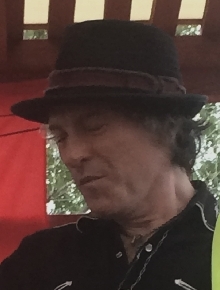
So great to hear we will have album(s) to look forward to!!! F**King A!
coolsville- saw tommy and chip in bklyn earlier this year-